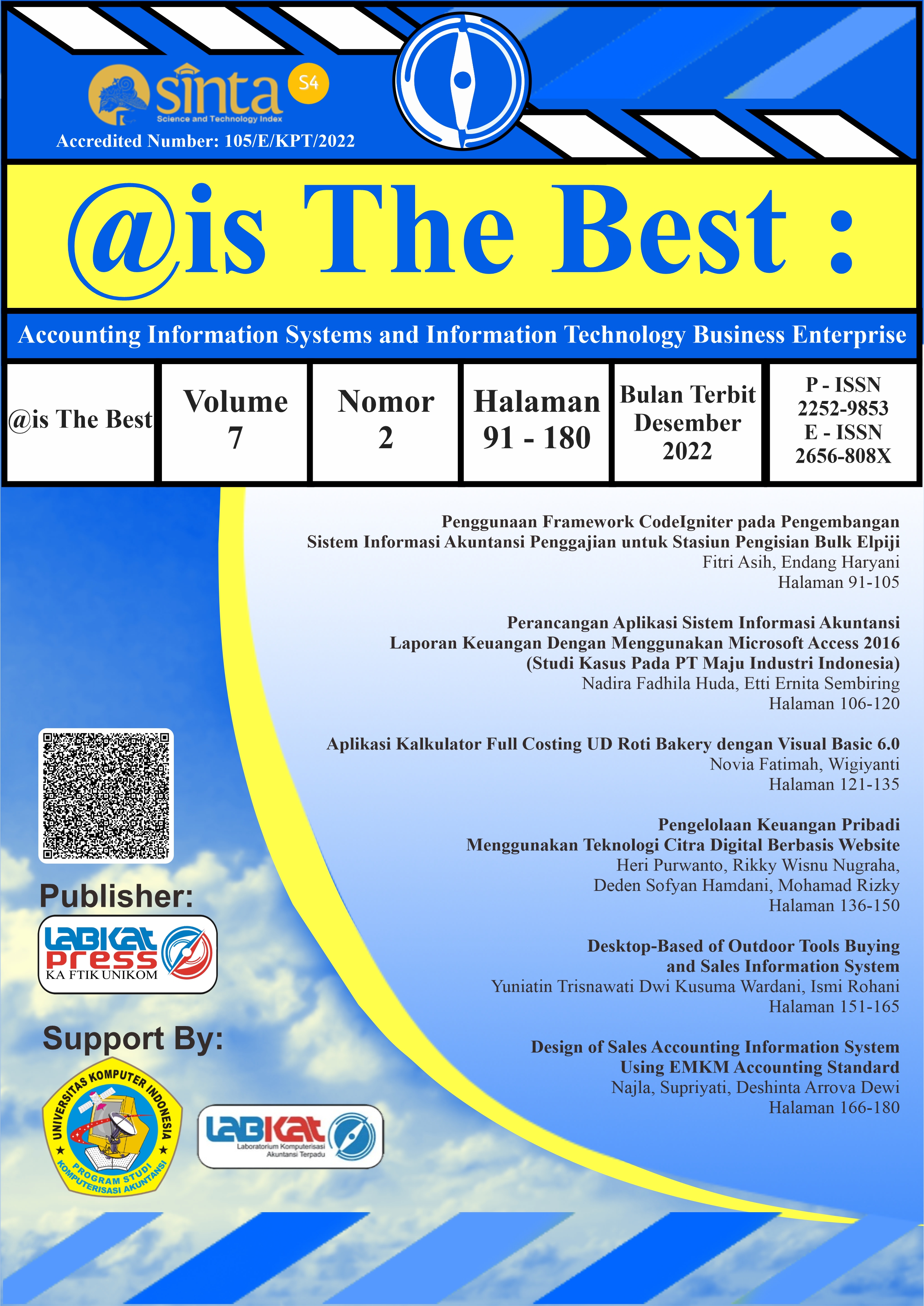Design of Sales Accounting Information System Using EMKM Accounting Standard
Main Article Content
Abstract
This study intends to design a sales accounting information system for UMKM Toko Utara Game. The purpose of this study is to design a sales information system with EMKM standards at Toko Utara Game that can be implemented as one of the human error risk management that might occur if the system is run conventionally and not computerized. The research method used in this study is a descriptive research method, in which the author analyzes and describes events that occur in the present with the intention of overcoming problems that occur at Toko Utara Game. The types of data used in this research are primary data and secondary data. Data collection techniques used in this study were interviews, observation and literature studies. The results of interviews and observations are used as primary data and the results of literature studies are used as secondary data. The system development methodology used in this study is the prototyping method with an object-oriented system design method using UML (Unified Modeling Language). The system design made in this study is a Use Case Diagram, an Activity Diagram, and uses an Entity Relationship Diagram (ERD). At the stage of creating the program code, researchers used the Java and MYSQL programming languages which were poured into the NetBeans IDE8.1 software using XAMPP as a web server. The result of this implementation is the design of a web-based sales application so that Toko Utara Game sales management can be computerized properly.
Downloads
Article Details
Section

This Journal is licensed under a Creative Commons Attribution-ShareAlike 4.0 International License
How to Cite
References
S. Supriyati, S. Mulyani, H. Suharman, and T. Supriadi, “The Influence of Business Models, Information Technology on the Quality of Accounting Information Systems Digitizing MSMEs Post-COVID-19,” J. Sist. Inf., vol. 18, no. 2, pp. 36–49, Oct. 2022, doi: 10.21609/jsi.v18i2.1141.
S. Supriyati et al., Pengantar Ilmu Ekonomi. Eureka Media Aksara, 2022.
S. Supriyati and R. Bahri, “Model Perancangan Sistem Informasi Akuntansi Laporan Keuangan Pondok Pesantren Berbasis SAK ETAP,” @is Best Account. Inf. Syst. Inf. Technol. Bus. Enterp., vol. 4, no. 2, pp. 151–165, Feb. 2020, doi: 10.34010/aisthebest.v4i02.2749.
Supriyati, “Pengaruh Kompetensi User, Keandalan Software Dan Keandalan Database Terhadap Kualitas Informasi Akuntansi (Survey Pada Perusahaan BUMN Yang Menerapkan Sistem Informasi Akuntansi Berpusat Di Kota Bandung),” J. Artik. Ilm., vol. 13, no. 1, pp. 13–24, 2015.
F. K. Chong and A. D. Deshinta, “A Review of Data Analytics Adoption in Business Industry,” INTI J., vol. 2019, no. 34, 2019.
Supriyati, Mudah Belajar Akuntansi Keuangan Dasar Bagi Pemula dan Pengusaha Muda dengan Standar IFRS. BANDUNG: Labkat Press Unikom, 2015.
Fajrillah et al., E-GOVERNMENT. Bandung: Media Sains Indonesia, 2022.
D. S. Soegoto and C. Cica, “Design of Web-based Sales Information System on Fashion Shop in Bandung, Indonesia,” IOP Conf. Ser. Mater. Sci. Eng., vol. 407, no. 1, p. 12023, 2018, doi: 10.1088/1757-899X/407/1/012023.
A. Habib and A. Kartika W. H., “Development of an Online Sales Information System for SMEs Using Incremental Methods,” INTENSIF J. Ilm. Penelit. dan Penerapan Teknol. Sist. Inf., vol. 4, no. 1 SE-Article, pp. 51–62, Feb. 2020, doi: 10.29407/intensif.v4i1.13524.
S. Wijaya, A. Andhika, and M. Ilyas, “DEVELOPMENT OF SALES INFORMATION SYSTEM FOR SME WITH THE WATERFALL METHOD: A GROCERY STORE BSR CASE,” J. Tek. Inform., vol. 3, no. 4 SE-Articles, pp. 1043–1049, Aug. 2022, doi: 10.20884/1.jutif.2022.3.4.263.
M. A. Purba, “Analisis penerapan SAK EMKM pada penyusunan laporan keuangan umkm di KOTA BATAM,” J. Akunt. Barelang, vol. 3, no. 2, pp. 55–63, 2019.
Munawar, Analisis Perancangan Sistem Berorientasi Objek dengan UML (Unified Modeling Language). Bandung: Informatika, 2018.
R. Daud, “Pengembangan sistem informasi akuntansi penjualan dan penerimaan kas berbasis komputer pada perusahaan kecil (studi kasus pada PT. Trust Technology),” J. Manaj. dan Bisnis Sriwij., vol. 12, no. 1, pp. 17–28, 2014.
Suhardi et al., Pengantar Ilmu Manajemen (Teori dan Implementasi). Serang Banten: PT Sada Kurnia Pustaka, 2022.
I. A. Indonesia, “Standar akuntansi keuangan entitas mikro, kecil, dan menengah,” Jakarta Dewan Standar Akunt. Keuang., 2016.

